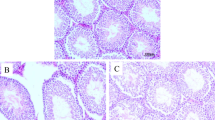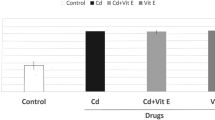Abstract
Zinc (Zn) plays an important role in spermatogenesis, and carbon tetrachloride (CCl4) induces testicular oxidative damage and cell death. The objective of the present study was to define the effects of Zn deficiency in combination with CCl4 treatment on testicular apoptosis and the associated mechanisms. Mice were fed the following diets with three different Zn levels for 6 weeks: normal zinc (ZN) diet (30 mg Zn/kg), zinc-deficient (ZD) diet (2 mg Zn/kg), and adequate zinc (ZA) diet (100 mg Zn/kg). Beginning in the third week, CCl4 was intraperitoneally injected into half of the mice in each diet group six times over 3 weeks. We found that Zn was distributed in various tissues and organs in normal mice and that the zinc content in the testis of normal mice was high. The Zn-deficient diet reduced the zinc concentration in the testis tissue, and the testicular/body weight ratio significantly decreased. Moreover, the TUNEL results proved that CCl4 stimulation of mice fed with a zinc-deficient diet caused marked apoptosis of testicular cells. Furthermore, the ROS levels in the testes obviously increased after Zn-deficient mice were stimulated with CCl4, whereas reduced glutathione (GSH) and glutathione peroxidase (GSH-Px) showed reduced activities. In addition, proteins associated with the apoptosis signaling pathway were detected with ELISA kits. P-p53, cleaved caspase-3, cleaved PRAP, p-Bad, p-JNK, p-ERK, and p-NF-κB p65 increased by varying degrees under zinc deficiency or CCl4 stimulation. All the data indicated that Zn deficiency significantly enhanced the harm to the testis induced by oxidative stress and damage, while CCl4 stimulation exacerbated the oxidative damage in testicular cells, leading to apoptosis through the activation of p53, MAPK, and NF-κB.





Similar content being viewed by others
References
Merrells KJ, Blewett H, Jamieson JA, Taylor CG, Suh M (2009) Relationship between abnormal sperm morphology induced by dietary zinc deficiency and lipid composition in testes of growing rats. British Journal of Nutrition 102:226-32
Chasapis CT, Loutsidou AC, Spiliopoulou CA, Stefanidou ME (2012) Zinc and human health: an update. Archives of toxicology 86:521-34
Maares M, Haase H (2016) Zinc and immunity: an essential interrelation. Arch Biochem Biophys 611:58–65
Ahangar N, Naderi M, Noroozi A, Ghasemi M, Zamani E, Shaki F (2017) Zinc Deficiency and Oxidative Stress Involved in Valproic Acid Induced Hepatotoxicity: Protection by Zinc and Selenium Supplementation. Biological trace element research 179:102-9
Zhao Y, Tan Y, Dai J, Li B, Guo L, Cui J (2011) Exacerbation of diabetes-induced testicular apoptosis by zinc deficiency is most likely associated with oxidative stress, p38 MAPK activation, and p53 activation in mice. Toxicology letters 200:100-6
Oteiza PI, Olin KL, Fraga CG, Keen CL (1995) Zinc Deficiency Causes Oxidative Damage to Proteins, Lipids and DNA in Rat Testes. The Journal of nutrition 125(4):823-9
Newsholme P, Cruzat VF, Keane KN, Carlessi R, de Bittencourt PI Jr Molecular (2016) mechanisms of ROS production and oxidative stress in diabetes. Biochem J 473(24):4527-50
Oliveira HC, Cosso RG, Alberici LC, Maciel EN, Salerno AG, Dorighello GG, Velho JA, de Faria EC, Vercesi AE (2005) Oxidative stress in atherosclerosis-prone mouse is due to low antioxidant capacity of mitochondria. FASEB J 19(2):278-80
Huang TC, Chang WT, Hu YC, Hsieh BS, Cheng HL, Yen JH (2018) Zinc Protects Articular Chondrocytes through Changes in Nrf2-Mediated Antioxidants, Cytokines and Matrix Metalloproteinases. Nutrients 10(4)
He X, Kan H Fau - Cai L, Cai L Fau - Ma Q, Ma Q (2009) Nrf2 is critical in defense against high glucose-induced oxidative damage in cardiomyocytes. Journal of molecular and cellular cardiology 46(1):47-58
Mukhammadiyeva GF, Karimov DO, Kutlina TG, Valova YV, Khusnutdinova NY, Repina EF (2019) Expression of Cell Cycle, Oxidative Stress, and Apoptosis Related Genes Chek1, Hmox1, Casp7 in Rat Liver Exposed to Carbon Tetrachloride. Molecular biology 53(1):84-90
Oyeyemi IT, Akanni OO, Adaramoye OA, Bakare AA (2017) Methanol extract of Nymphaea lotus ameliorates carbon tetrachloride-induced chronic liver injury in rats via inhibition of oxidative stress. J Basic Clin Physiol Pharmacol 28(1):43-50
Ma JQ, Liu CM, Yang W (2018) Protective effect of rutin against carbon tetrachloride-induced oxidative stress, inflammation and apoptosis in mouse kidney associated with the ceramide, MAPKs, p53 and calpain activities. Chemico-biological interactions 286:26-33
Ouyang L, Shi Z, Zhao S, Wang FT, Zhou TT, Liu B (2012) Programmed cell death pathways in cancer: a review of apoptosis, autophagy and programmed necrosis. Cell Proliferation 90:487-98
Eriksson SE, Ceder S, Bykov VJN, Wiman KG (2019) p53 as a hub in cellular redox regulation and therapeutic target in cancer. Journal of molecular cell biology 11(4):330-341
Erster S, Mihara M, Kim RH, Petrenko O, Moll UM (2004) In vivo mitochondrial p53 translocation triggers a rapid first wave of cell death in response to DNA damage that can precede p53 target gene activation. Molecular and cellular biology 24(15):6728-41
Chai F, Truong-Tran AQ, Ho LH, Zalewski PD (1999) Regulation of caspase activation and apoptosis by cellular zinc fluxes and zinc deprivation: A review. Immunol Cell Biol 77(3):272-8
Chimienti F, Seve M, Richard S, Mathieu J, Favier A (2001) Role of cellular zinc in programmed cell death: temporal relationship between zinc depletion, activation of caspases, and cleavage of Sp family transcription factors. Biochem Pharmacol 62(1):51-62
Alcantara EH1, Shin MY, Feldmann J, Nixon GF, Beattie JH, Kwun IS (2013) Long-term zinc deprivation accelerates rat vascular smooth muscle cell proliferation involving the down-regulation of JNK1/2 expression in MAPK signaling. Atherosclerosis 228(1):46-52
Paul M, Kemparaju K, Girish KS (2017) Inhibition of constitutive NF-κB activity induces platelet apoptosis via ER stress. Biochem Biophys Res Commun 493(4):1471-1477
Zhao Y, Wang Z, Feng D, Zhao H, Lin M, Hu Y (2019) p66Shc Contributes to Liver Fibrosis through the Regulation of Mitochondrial Reactive Oxygen Species. Theranostics 9:1510-22
Zhang J, Yang A, Wu Y, Guan W, Xiong B, Peng X, Wei X, Chen C, Liu Z (2018) Stachydrine ameliorates carbon tetrachloride-induced hepatic fibrosis by inhibiting inflammation, oxidative stress and regulating MMPs/TIMPs system in rats. Biomed Pharmacother 97:1586-1594
Stefanini M (1999) Cutaneous bleeding related to zinc deficiency in two cases of advanced cancer. Cancer 86(5):866-70
Zhang G, Liu K, Ling X, Wang Z, Zou P, Wang X, Gao J, Yin L, Zhang X, Liu J, Ao L, Cao J (2016) DBP-induced endoplasmic reticulum stress in male germ cells causes autophagy, which has a cytoprotective role against apoptosis in vitro and in vivo. Toxicol Lett 245:86-98
Jayesh K, Helen LR, Vysakh A, Binil E, Latha MS (2019) Protective Role of Terminalia bellirica (Gaertn.) Roxb Fruits Against CCl4 Induced Oxidative Stress and Liver Injury in Rodent Model. Indian J Clin Biochem 34(2):155-163
Yu Y, Li ZA, Cao G, Huang S, Yang HA (2019) Bamboo Leaf Flavonoids Extracts Alleviate Oxidative Stress in HepG2 Cells via Naturally Modulating Reactive Oxygen Species Production and Nrf2-Mediated Antioxidant Defense Responses. J Food Sci 84(6):1609-1620
Chen QM, Maltagliati AJ (2018) Nrf2 at the heart of oxidative stress and cardiac protection. Physiol Genomics 50(2):77-97
Corniola RS, Tassabehji NM, Hare J, Sharma G, Levenson CW (2008) Zinc deficiency impairs neuronal precursor cell proliferation and induces apoptosis via p53-mediated mechanisms. Brain Res 1237:52-61
Templin AT, Samarasekera T, Meier DT, Hogan MF, Mellati M, Crow MT, Kitsis RN, Zraika S, Hull RL, Kahn SE (2017) Apoptosis Repressor With Caspase Recruitment Domain Ameliorates Amyloid-Induced beta-Cell Apoptosis and JNK Pathway Activation. Diabetes 66(10):2636-2645
Sui X, Kong N, Ye L, Han W, Zhou J, Zhang Q, He C, Pan H (2014) p38 and JNK MAPK pathways control the balance of apoptosis and autophagy in response to chemotherapeutic agents. Cancer Lett 344(2):174-9
Park SG, Kim SH, Kim KY, Yu SN, Choi HD, Kim YW (2017) Toyocamycin induces apoptosis via the crosstalk between reactive oxygen species and p38/ERK MAPKs signaling pathway in human prostate cancer PC-3 cells. Pharmacol Rep 69(1):90-96
Sandstead HH, Prasad AS, Penland JG, Beck FW, Kaplan J, Egger NG, Alcock NW, Carroll RM, Ramanujam VM, Dayal HH, Rocco CD, Plotkin RA, Zavaleta AN (2008) Zinc deficiency in Mexican American children: influence of zinc and other micronutrients on T cells, cytokines, and antiinflammatory plasma proteins. Am J Clin Nutr 88(4):1067-73
Kambe T, Fukue K, Ishida R, Miyazaki S (2015) Overview of Inherited Zinc Deficiency in Infants and Children. J Nutr Sci Vitaminol 61 Suppl:S44-6
Mwangi MN, Oonincx DGAB, Stouten T, Veenenbos M, Melse-Boonstra A, Dicke M, van Loon JJA (2018) Insects as sources of iron and zinc in human nutrition. Nutr Res Rev 31(2):248-255
Funding
This research was supported by the National Natural Science Foundation of China (no. 31502130), the National Students Innovation and Entrepreneurship Training Program for college students of Huazhong Agricultural University (no. 201710504008).
Author information
Authors and Affiliations
Corresponding author
Additional information
Publisher’s Note
Springer Nature remains neutral with regard to jurisdictional claims in published maps and institutional affiliations.
Rights and permissions
About this article
Cite this article
Chen, Y., Yang, J., Wang, Y. et al. Zinc Deficiency Promotes Testicular Cell Apoptosis in Mice. Biol Trace Elem Res 195, 142–149 (2020). https://doi.org/10.1007/s12011-019-01821-4
Received:
Accepted:
Published:
Issue Date:
DOI: https://doi.org/10.1007/s12011-019-01821-4




